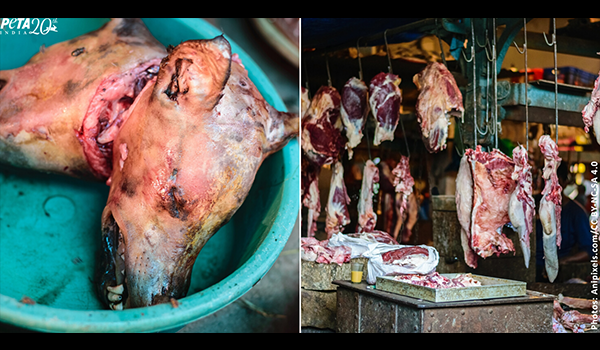Update: 13 April 2021
The first domino has fallen! Since the start of the pandemic, PETA affiliates have pushed the World Health Organization (WHO) to call for the closure of live-animal markets worldwide. Well, it’s now happening: WHO is urging countries to suspend the sale of live wild mammals in food markets as an emergency measure, saying that wild animals are a leading cause of emerging infectious diseases like COVID-19. We told you that a year ago!
This is a good start but does nothing to stop frogs, snakes, chickens, and others from being sold, even though confining and killing them in filthy live-animal markets also contributes to the spread of disease. As long as live-animal markets remain open and any animal is sold, intelligent and sensitive beings will continue to suffer and humans will be at enormous risk.
Thank you to everyone who took action below – please keep going: share this alert with your friends and family and anyone else you know until WHO calls for the closure of all live-animal markets.
Regarding the current pandemic, the US Centers for Disease Control and Prevention says, "The first infections were linked to a live animal market" in China. The novel coronavirus is believed to have jumped the species barrier to humans from wildlife used for meat. SARS is believed to have first infected humans at a similar live-animal market (also called a "wet market") in China.
Creutzfeldt-Jakob disease, avian flu, swine flu, HIV, Ebola, and other diseases in humans have been linked to animal flesh production or consumption. But not all of these come from live-animal markets – Creutzfeldt-Jakob disease, a variant of mad cow disease, for instance, can affect a person who has eaten certain body parts of an infected cow – but such markets, where stressed, injured, and sick animals are commonly caged in public areas, offer the perfect opportunity for animal diseases to infect humans. In this video, Peter Li, an associate professor at the University of Houston–Downtown, states that at wet markets, "The cages are stacked one over another. Animals at the bottom are often soaked with all kinds of liquid. Animal excrement, pus, blood." Such conditions allow viruses to spread from one animal to another as well as to humans who come into contact with them.
Although the Huanan Seafood Wholesale Market in Wuhan, China, where the coronavirus is thought to have first infected humans, was closed and that country banned the consumption and farming of "wild" animals, there are reports that wet markets in China are reopening. It's important to note that diseases don't just affect "wild" animals. In 1997, outbreaks of H5N1 bird flu were reported in chickens at farms and wet markets in Hong Kong, and that same year saw the first human infections of H5N1 in Hong Kong. H5N1 bird flu kills about 60% of humans who catch it. Many wet markets continue to operate in other countries, too – throughout Asia, Africa, Europe, and the US. This includes India, where there are thousands of live-animal meat shops and unlicensed slaughterhouses.

Just as we don't want to be infected with or die of a disease, other animals don't want to suffer or be killed for food. A hen, for example, just wants to be left in peace so that she can familiarise her chicks with the sound of her voice before they hatch (much like a human mother talking to her baby in the womb) and show them how to survive. And fish just want to be left alone so that they can protect their young, build nests, and swim where they please.
No matter what species they're peddling, live-animal markets will continue to put the human population at risk as well as sentencing countless animals to a miserable death.
Join PETA India in requesting that the World Health Organization call for an end to deadly live-animal markets around the globe.